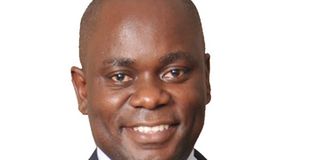Boost service sector to uplift economy – experts

Dr. Fred K. Muhumuza
What you need to know:
The Central Bank said the most recent quarterly real GDP data from Uganda Bureau of Statistics shows the economy grew by 1.6 per cent in the second quarter of FY 2020/2021 up from a contraction of 6.1 per cent in the second quarter and 0.1 per cent in the third quarter of 2020
Economists have advised government to focus more on services sector to realise a faster economic growth and reduction in poverty levels.
Speaking at a high-level policy dialogue at Kampala Serena Hotel yesterday, Dr Fred Muhumuza, a senior lecturer at Makerere University, said the services sector contributes 50 per cent of Uganda’s total GDP yet its performance showed it was the most affected at the height of the Covid-19 pandemic.
“When you look at the quarterly GDP growth rate of the fiscal year 2020/2021, the services sub-sector registered -24. 0 in quarter one (negative or minus), in quarter two it registered -45.0, so the government needs to provide more support for the services sector to revive the sector’s contribution to the GDP,” he said.
In terms of urbanisation, Dr Muhumuza said the development of cities cannot be realised using the budgetary allocation to cities and, therefore called for a mechanism of making cities become investment/productivity hubs of the nation.
Urban centres have been growing at a rate of 5 per cent per annum. Government has created more than five cities in this financial year with minimal budgetary allocations.
The economy gained momentum after the Covid-19-induced lockdown.
In its monetary policy report of April, Bank of Uganda indicated that the estimate for the fourth quarter of 2020 suggests a strong recovery in economic activity.
The Central Bank said the most recent quarterly real GDP data from Uganda Bureau of Statistics shows the economy grew by 1.6 per cent in the second quarter of FY 2020/2021 up from a contraction of 6.1 per cent in the second quarter and 0.1 per cent in the third quarter of 2020.
This strong rebound was largely driven by industry and agriculture sectors, which grew by 5.9 per cent and 3.1 per cent in quarter two of FY 2020/2021 from respective growth rates of 9.5 per cent and 8.8 per cent in quarter two of the previous year.
The bank said the services sector has continued to post negative growth rates, largely due to the protracted lockdown measures on the sector. Nevertheless, it is on the recovery path; services value added was -2.6 per cent in quarter four, up from -4.6 per cent in quarter three and -6.1 per cent in quarter three of 2020.
The deputy chief coordinator of Operation Wealth Creation, Lt Gen Charles Agina, said their purpose is to deepen the decentralisation process, improve household incomes, enable inclusive, sustainable, balanced and equitable socio-economic transformation.
He said the parish model is the lowest unit for planning, budgeting and delivery of interventions for socio-economic transformation.
Lt Gen Agina added that the parish development plans, budgets, workplans and reports will be prepared, coordinated and managed by the parish chief and parish development committee and later sent to the sub-county for incorporation into the main sub-county
He also stated that the MoLG shall be responsible for ensuring that the interventions and activities of stakeholders under the PDM are conducted in compliance with the Local Government Act.
“The goal of the PDM is to increase household incomes and improve quality of life of Ugandans He said the overall objective is to increase the effectiveness of the interaction between the government and citizens to accelerate realization of socio-economic transformation. This implies total transformation of the subsistence households (both on-farm and off-farm, in rural and urban settings) into the money economy, as well as eradication of poverty and vulnerability,” he said.
He said the Pillars of the Parish Development Model is composed of Production, Storage, Processing and Marketing as pillar one, pillar two Infrastructure and Economic Services.
Pillar five is Financial Inclusion, Social Services, Mind set change and cross cutting issues (Gender, environment, Disability.
Pillar six Parish Based Management Information System and seven is Governance and Administration
The managing director of Uganda Coffee Development Authority (UCDA) Mr Emmanuel Iyamulemye said coffee is grown in 126 districts out of the 146 districts Uganda and it is the second most traded commodity globally after gold.
He said the coffee sector must be supported so much because it brings a lot of foreign exchange into the country.
Revenue collection
The IMF resident representative in Uganda, Ms Izabella Karpowicz, said the Uganda government should widen the tax base to be able to collect more taxes, improve taxes administration and transparency and avoid giving many tax exemptions.
“You need to widen the tax base instead of working towards increasing taxes, think about where you can collect more taxes and not exemptions,” she said. On government borrowing, she said Uganda borrowing for what matters a lot. Concerning budget spending Ms Karpowicz said government spending social sector has been declining over times. She advised government to spend more in social sectors to drive recovery in Uganda’s economic growth.
Ms Julie Njuba, the assistant commissioner at Uganda Revenue Authority (URA), expressed doubts that URA will not be able to meet revenue for the financial year 2020/2021 due shortfalls they are experiencing. “The total revenue collection in taxes from July 2020 up April 2021 is Shs16 trillion, we are left with only two months to collect a balance of Shs5 trillion to meet the target,” she said.




